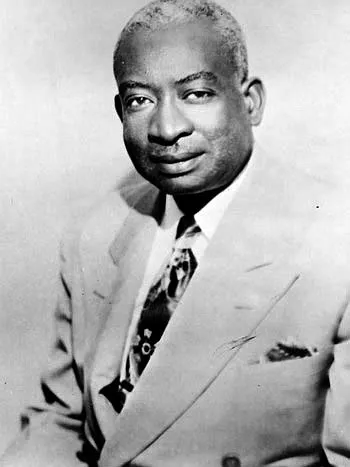
Inducted 1982
Thomas A. Dorsey
(1899 – 1993)
Thomas A. Dorsey is the acknowledged father of Black Gospel music and perhaps the most influential figure ever to impact the genre.
Although the scope Thomas A. Dorsey’s influence on gospel music runs well beyond his song writing, he is best known as the writer of the classic songs Take My Hand Precious Lord and Peace in the Valley. He was a versatile composer whose material shifted from energetic hard gospel to hymns. Dorsey was the founder of the National Convention of Gospel Choirs and Choruses in 1932, and a pioneering force in the renowned Chicago gospel community of the 1930s, where he helped launch the careers of legends Mahalia Jackson and Sallie Martin.
A child prodigy, he taught himself a wide range of instruments, and was playing ragtime while still in his teens under the name “Georgia Tom.” During this pre-gospel time of his life in the 1920s, he was a prolific composer, authoring witty, sometimes slightly racy blues songs. After suffering his second nervous breakdown in as many years, he opted to retire from the music business. A two-year recovery period followed, including a spiritual awakening, during which time a minister convinced him to return to music, albeit to move from blues to gospel and the church.
His first attempt at writing a gospel song, 1921’s If I Don’t Get There, had met with some success, and he now returned to song writing with a renewed sense of purpose, renouncing secular music to devote all his talents to the church circuit. In the days before records were readily available to sell, Dorsey resorted to peddling song sheets to make a living. His luck appeared to be on the upswing by 1932, the year he organized one of the first gospel choirs at Chicago’s Pilgrim Baptist Church and also founded the first publishing house devoted exclusively to selling music by black gospel composers.
Tragedy struck when his wife died giving birth to their son who himself died two days later. Devastated, Dorsey locked himself inside his music room for three straight days, emerging with a completed draft of Take My Hand, Precious Lord, a song whose popularity in the gospel community is rivaled only by Amazing Grace. Eventually able to set his sorrow and loss behind him, Dorsey enjoyed his most prolific period in the years that followed, authoring dozens of songs with a distinctively optimistic sensibility for an audience held in the grip of the Depression.
Dorsey’s charge to the top of the religious music market in both the white and black circles was due in part to his presence in the fabulously successful African –American music conferences and evangelical conventions of the era. That exposure, coupled with the fact that the giants in the Southern Gospel publishing industry began to use his songs in their widely-distributed hymnbooks placed Dorsey on the gospel song writing A-list. First at the Stamps-Baxter company in Dallas, then at R.E. Winsett and Homer Rodeheaver’s publishing houses, Dorsey’s words and music crossed racial boundaries and opened the doors of many white churches for the composer’s special type of musical odes influenced by black blues. Even while Dorsey was bringing a new kind of religious substance and zeal to the music of the Black Gospel community, he was influencing hundreds of white composers and performers. The effects of this influence did more than change the feel of white religious music; it also sharply influenced country, rockabilly, and rock and roll.
Peace in the Valley became a gold selling hit record for future Country Music Hall of Fame inductee Red Foley in 1951, the song so associated with Foley that there was the mistaken impression that Foley wrote the song. One person mesmerized by Foley’s recording was a young Elvis Presley. While Foley had taken Peace in the Valley to millions of country music fans, it was Presley who introduced the song to the world. During one of his highly publicized guest shots on the Ed Sullivan Show in 1956, Elvis and the Jordanaires Quartet performed the Dorsey composition for a national television audience. The 1956 performance literally changed the public’s perception of Elvis from that of a rebel to “All-American” boy. Through Red Foley and Elvis Presley, Peace in the Valley became one of the ten best known gospel standards of all time.
Dorsey’s legacy is rich with impact and significance. Just the National Convention of Gospel Choirs and Choruses alone as of 2020 sports 50 chapters around the world. Consideration as the father of Black Gospel music is a title not to be taken lightly, but if ever someone deserved such a distinction it would be Thomas A. Dorsey.
Additional note of interest:
Dorsey was one of the first, if not the first, to coin the term “gospel music” when in 1920 he used the term to refer to his song If You See My Savior. Prior to then, religious songs were called either a “hymn” or a “spiritual.”
See additional GMA Hall of Fame entries for: Mahalia Jackson, Sallie Martin, R.E. Winsett, Homer Rodeheaver, Elvis Presley, The Jordanaires.
Content/source: All Music Guide/Jason Ankeny (4th Edition 2001), Turn Your Radio On/Ace Collins (1999), adapted/edited/additional writing by GMA Hall Of Fame staff member Jon Robberson Sr. (April, 2021)
Tragedy struck when his wife died giving birth to their son who himself died two days later. Devastated, Dorsey locked himself inside his music room for three straight days, emerging with a completed draft of Take My Hand, Precious Lord, a song whose popularity in the gospel community is rivaled only by Amazing Grace. Eventually able to set his sorrow and loss behind him, Dorsey enjoyed his most prolific period in the years that followed, authoring dozens of songs with a distinctively optimistic sensibility for an audience held in the grip of the Depression.
Dorsey’s charge to the top of the religious music market in both the white and black circles was due in part to his presence in the fabulously successful African –American music conferences and evangelical conventions of the era. That exposure, coupled with the fact that the giants in the Southern Gospel publishing industry began to use his songs in their widely-distributed hymnbooks placed Dorsey on the gospel song writing A-list. First at the Stamps-Baxter company in Dallas, then at R.E. Winsett and Homer Rodeheaver’s publishing houses, Dorsey’s words and music crossed racial boundaries and opened the doors of many white churches for the composer’s special type of musical odes influenced by black blues. Even while Dorsey was bringing a new kind of religious substance and zeal to the music of the Black Gospel community, he was influencing hundreds of white composers and performers. The effects of this influence did more than change the feel of white religious music; it also sharply influenced country, rockabilly, and rock and roll.
Peace in the Valley became a gold selling hit record for future Country Music Hall of Fame inductee Red Foley in 1951, the song so associated with Foley that there was the mistaken impression that Foley wrote the song. One person mesmerized by Foley’s recording was a young Elvis Presley. While Foley had taken Peace in the Valley to millions of country music fans, it was Presley who introduced the song to the world. During one of his highly publicized guest shots on the Ed Sullivan Show in 1956, Elvis and the Jordanaires Quartet performed the Dorsey composition for a national television audience. The 1956 performance literally changed the public’s perception of Elvis from that of a rebel to “All-American” boy. Through Red Foley and Elvis Presley, Peace in the Valley became one of the ten best known gospel standards of all time.
Dorsey’s legacy is rich with impact and significance. Just the National Convention of Gospel Choirs and Choruses alone as of 2020 sports 50 chapters around the world. Consideration as the father of Black Gospel music is a title not to be taken lightly, but if ever someone deserved such a distinction it would be Thomas A. Dorsey.
Additional note of interest:
Dorsey was one of the first, if not the first, to coin the term “gospel music” when in 1920 he used the term to refer to his song If You See My Savior. Prior to then, religious songs were called either a “hymn” or a “spiritual.”
See additional GMA Hall of Fame entries for: Mahalia Jackson, Sallie Martin, R.E. Winsett, Homer Rodeheaver, Elvis Presley, The Jordanaires.
Content/source: All Music Guide/Jason Ankeny (4th Edition 2001), Turn Your Radio On/Ace Collins (1999), adapted/edited/additional writing by GMA Hall Of Fame staff member Jon Robberson Sr. (April, 2021)



